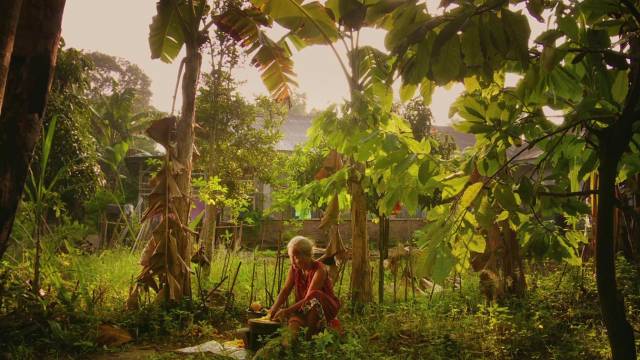
 In The Act of Killing, filmmaker Joshua Oppenheimer chronicled the brutal Indonesian genocide of 1965, during which almost one million so-called “communists” were murdered by Suharto’s army. While that film focused on the film-loving gangsters who led one of the most vicious death squads in North Sumatra and are still regarded as national heroes, its follow-up The Look of Silence centers on the victims’ families and how they are forced to live next to the same people who murdered their loved ones. Silence focuses on Adi, an optician who was born after the killings, but who grew up listening to the horrific accounts of how his brother Ramli was taken from their home and slaughtered in an oil palm plantation.
In The Act of Killing, filmmaker Joshua Oppenheimer chronicled the brutal Indonesian genocide of 1965, during which almost one million so-called “communists” were murdered by Suharto’s army. While that film focused on the film-loving gangsters who led one of the most vicious death squads in North Sumatra and are still regarded as national heroes, its follow-up The Look of Silence centers on the victims’ families and how they are forced to live next to the same people who murdered their loved ones. Silence focuses on Adi, an optician who was born after the killings, but who grew up listening to the horrific accounts of how his brother Ramli was taken from their home and slaughtered in an oil palm plantation.
Because communism was believed to be a malady almost, the victims’ friends and families were denied the chance to grieve them publicly, in fear that they would be killed next by association. We can see the pain in Adi’s parents, both of whom have carried the pain of losing their son for almost five decades. What Oppenheimer and Adi set to do next is bold and courageous, they visit the people involved in Ramli’s murder and seek answers. Adi is looking for reasons to forgive them and move on, Oppenheimer is going beyond the limitations of nonfiction filmmaking and creating perhaps the most alive thriller ever made.
Adi fits the murderers and accomplices for glasses, creating a metaphor about how he wants to help them finally see what they’ve done, but is usually met with evasions, “you ask too many questions”, “I don’t want to talk politics” they say, but Adi doesn’t stop his questioning, making for some truly heart-stopping moments. As he tries to understand why his entire lifetime was practically predetermined by a brutal event from the past, we come to understand that this is a country that has two parallel histories, one of unspeakable horrors now being taught as heroism, and the other of quiet pain that has denied a large part of the population of their dignity.
Oppenheimer expertly draws other parallels that make the film stay with us long after it has ended, as he point out the fact that longevity can both be seen as a blessing and punishment, as we see Adi’s parents both make it way into their 90s (“he’s 140” jokes his mother about her husband) while some of the perpetrators have been dead for long or have developed dementia, which gives them a mental clean slate, if they even harbored any guilt to begin with. The Look of Silence is a brilliant exercise in seeing forgiveness, confronting one’s history and as such, it’s utterly unforgettable.